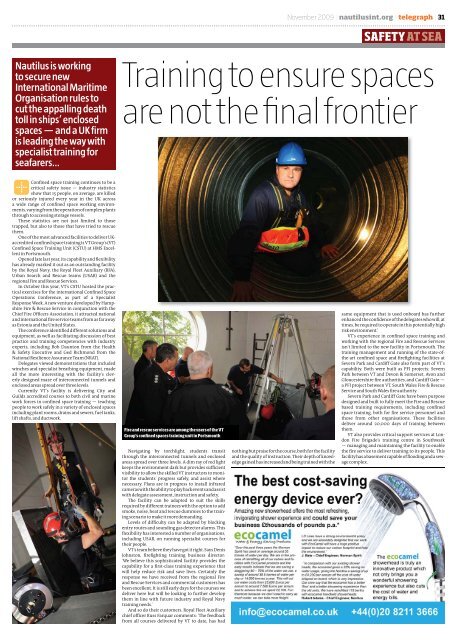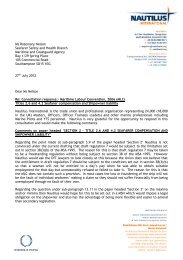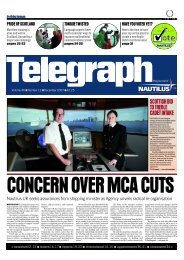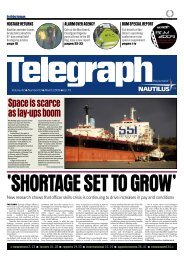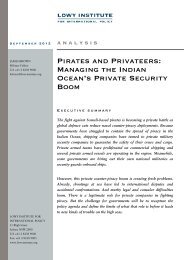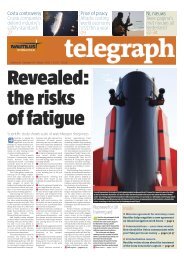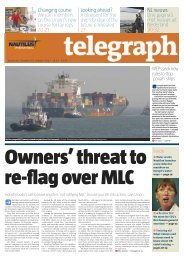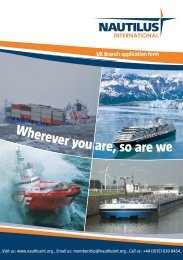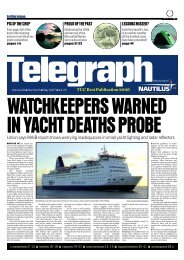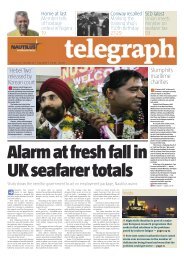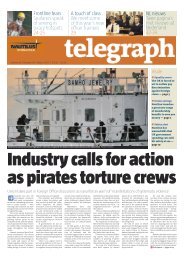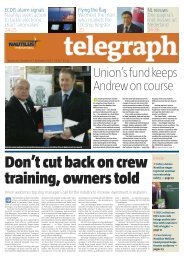NAUTILUS P01 NOVEMBER 2009.qxd - Nautilus International
NAUTILUS P01 NOVEMBER 2009.qxd - Nautilus International
NAUTILUS P01 NOVEMBER 2009.qxd - Nautilus International
Create successful ePaper yourself
Turn your PDF publications into a flip-book with our unique Google optimized e-Paper software.
November 2009 | nautilusint.org | telegraph | 31<br />
SAFETY AT SEA<br />
<strong>Nautilus</strong> is working<br />
to secure new<br />
<strong>International</strong> Maritime<br />
Organisation rules to<br />
cut the appalling death<br />
toll in ships’ enclosed<br />
spaces — and a UK firm<br />
is leading the way with<br />
specialist training for<br />
seafarers…<br />
Training to ensure spaces<br />
are not the final frontier<br />
I<br />
Confined space training continues to be a<br />
critical safety issue — industry statistics<br />
show that 15 people, on average, are killed<br />
or seriously injured every year in the UK across<br />
a wide range of confined space working environments,<br />
varying from the operation of complex plants<br />
through to accessing storage vessels.<br />
These statistics are not just limited to those<br />
trapped, but also to those that have tried to rescue<br />
them.<br />
One of the most advanced facilities to deliver UKaccredited<br />
confined space training is VT Group’s (VT)<br />
Confined Space Training Unit (CSTU) at HMS Excellent<br />
in Portsmouth.<br />
Opened late last year, its capability and flexibility<br />
has already marked it out as an outstanding facility<br />
by the Royal Navy, the Royal Fleet Auxiliary (RFA),<br />
Urban Search and Rescue teams (USAR) and the<br />
regional Fire and Rescue Services.<br />
In October this year, VT’s CSTU hosted the practical<br />
exercises for the international Confined Space<br />
Operations Conference, as part of a Specialist<br />
Response Week. A new venture developed by Hampshire<br />
Fire & Rescue Service in conjunction with the<br />
Chief Fire Officers Association, it attracted national<br />
and international fire service teams from as far away<br />
as Estonia and the United States.<br />
The conference identified different solutions and<br />
equipment, as well as facilitating discussion of best<br />
practice and training competencies with industry<br />
experts, including Bob Daunton from the Health<br />
& Safety Executive and Ged Richmond from the<br />
National Resilience Assurance Team (NRAT).<br />
Delegates viewed demonstrations that included<br />
winches and specialist breathing equipment, made<br />
all the more interesting with the facility’s cleverly<br />
designed maze of interconnected tunnels and<br />
enclosed areas spread over three levels.<br />
Currently VT’s facility is delivering City and<br />
Guilds accredited courses to both civil and marine<br />
work forces in confined space training — teaching<br />
people to work safely in a variety of enclosed spaces<br />
including plant rooms, drains and sewers, fuel tanks,<br />
lift shafts, and ductwork.<br />
Fire and rescue services are among the users of the VT<br />
Group’s confined spaces training unit in Portsmouth<br />
Navigating by torchlight, students transit<br />
through the interconnected tunnels and enclosed<br />
areas spread over three levels. A dim ray of red light<br />
keeps the environment dark but provides sufficient<br />
visibility to allow the skilled VT instructors to monitor<br />
the students’ progress safely, and assist where<br />
necessary. Plans are in progress to install infrared<br />
cameras with the ability to play back events and assist<br />
with delegate assessment, instruction and safety.<br />
The facility can be adapted to suit the skills<br />
required by different trainees with the option to add<br />
smoke, noise, heat and rescue dummies to the training<br />
scenario to make it more demanding.<br />
Levels of difficulty can be adapted by blocking<br />
entry routes and sounding gas detector alarms. This<br />
flexibility has interested a number of organisations,<br />
including USAR, on running specialist courses for<br />
their people.<br />
VT’s team believe they have got it right. Says Denis<br />
Johnston, firefighting training business director:<br />
‘We believe this sophisticated facility provides the<br />
capability for a first-class training experience that<br />
will help reduce risk and save lives. Certainly the<br />
response we have received from the regional Fire<br />
and Rescue Services and commercial customers has<br />
been excellent. It is still early days for the courses we<br />
deliver here but will be looking to further develop<br />
them in line with future industry and Royal Navy<br />
training needs.’<br />
And so do their customers. Royal Fleet Auxiliary<br />
chief officer Russ Farquar comments: ‘The feedback<br />
from all courses delivered by VT to date, has had<br />
nothing but praise for the course, both for the facility<br />
and the quality of instruction. Their depth of knowledge<br />
gained has increased and being trained with the<br />
same equipment that is used onboard has further<br />
enhanced the confidence of the delegates who will, at<br />
times, be required to operate in this potentially high<br />
risk environment.’<br />
VT’s experience in confined space training and<br />
working with the regional Fire and Rescue Services<br />
isn’t limited to the new facility in Portsmouth. The<br />
training management and running of the state-ofthe-art<br />
confined space and firefighting facilities at<br />
Severn Park and Cardiff Gate also form part of VT’s<br />
capability. Both were built as PFI projects; Severn<br />
Park between VT and Devon & Somerset, Avon and<br />
Gloucestershire fire authorities, and Cardiff Gate —<br />
a PFI project between VT, South Wales Fire & Rescue<br />
Service and South Wales fire authority.<br />
Severn Park and Cardiff Gate have been purpose<br />
designed and built to fully meet the Fire and Rescue<br />
based training requirements, including confined<br />
space training, both for fire service personnel and<br />
those from other organisations. These facilities<br />
deliver around 20,000 days of training between<br />
them.<br />
VT also provides critical support services at London<br />
Fire Brigade’s training centre in Southwark<br />
— managing and maintaining the facility to enable<br />
the fire service to deliver training to its people. This<br />
facility has a basement capable of flooding and a sewage<br />
complex.


